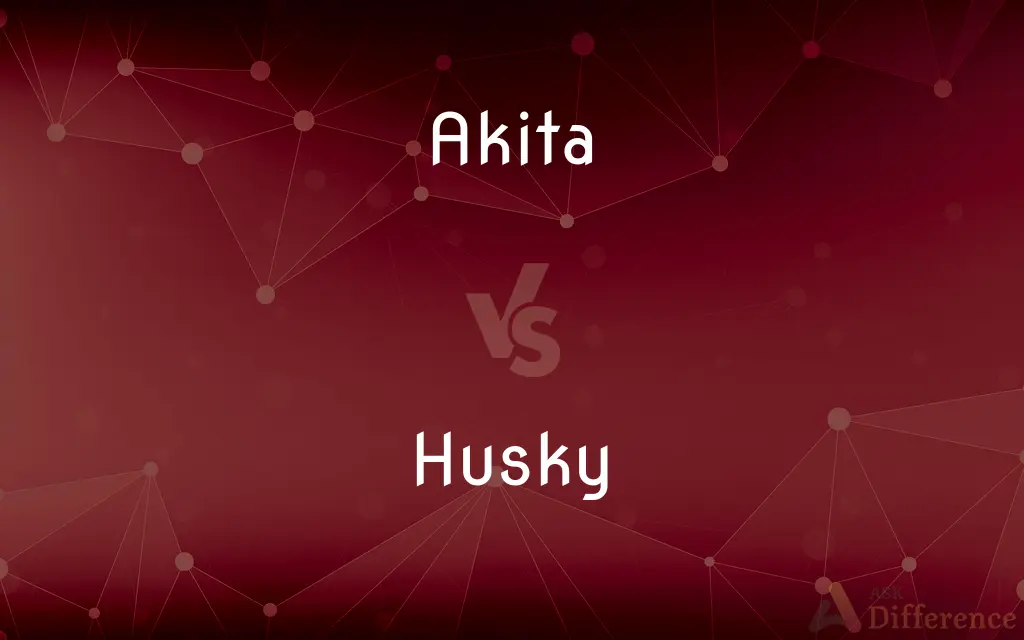Akita vs. Husky — What's the Difference?
By Tayyaba Rehman & Urooj Arif — Published on February 4, 2024
Akitas are large, powerful dogs with a strong, independent personality, originating from Japan. Huskies are medium-sized, energetic dogs known for their endurance and sociability, originating from Siberia.

Difference Between Akita and Husky
Table of Contents
ADVERTISEMENT
Key Differences
Akitas are a Japanese breed known for their loyalty and dignified demeanor, contrasting with Huskies, a Siberian breed, recognized for their friendly nature and high energy levels.
The Akita has a more robust and bear-like appearance, with a dense double coat, while the Husky is known for its wolf-like features and lighter build, with a similarly thick coat.
In terms of temperament, Akitas are often more aloof and reserved, especially with strangers, unlike Huskies, who are generally outgoing and gregarious.
Akitas tend to be more independent and can be challenging to train due to their strong-willed nature; conversely, Huskies, while intelligent, are more cooperative but can be stubborn.
Akitas are better suited as watchdogs due to their protective instincts, whereas Huskies, with their friendly disposition, are not typically used for guarding but excel in activities requiring endurance.
ADVERTISEMENT
Comparison Chart
Origin
Japan
Siberia
Size
Large and robust
Medium-sized and athletic
Coat
Dense double coat
Thick but lighter double coat
Temperament
Loyal, independent, and reserved
Energetic, friendly, and sociable
Training
Independent, can be challenging to train
Intelligent but may exhibit stubbornness
Compare with Definitions
Akita
Loyal and Protective
Our Akita is an excellent guard dog for our home.
Husky
Sociable and Friendly Dog
Our Husky loves meeting new people and pets.
Akita
Independent Temperament
The Akita's independent nature requires patient training.
Husky
Medium-Sized and Energetic
Huskies require a lot of exercise and play.
Akita
Japanese Dog Breed
The Akita is admired for its loyalty and strength.
Husky
Thick-Coated for Cold Climates
The Husky's coat keeps it warm in snowy conditions.
Akita
Large and Powerful Dog
Akitas are known for their imposing stature.
Husky
Siberian Dog Breed
The Husky is famous for its role in sled racing.
Akita
Dense Double-Coated Dog
The Akita's thick coat needs regular grooming.
Husky
Endurance and Stamina
Huskies can run long distances without tiring.
Akita
A dog of a large breed developed in Japan for hunting, having small erect ears, a curled tail carried over the back, and a thick coat of various colors.
Husky
Hoarse or rough in quality
A voice husky with emotion.
Husky
Resembling a husk.
Husky
Containing husks.
Husky
Strongly built; burly.
Husky
Heavily built
Clothing sizes for husky boys.
Husky
A husky person.
Husky
A dog of any of various compact, thick-coated Arctic breeds developed as sled dogs, especially the Siberian husky.
Husky
(of a voice) Hoarse and rough-sounding.
Husky
Burly, stout.
Husky
Abounding with husks; consisting of husks.
Husky
Any of several breeds of dogs used as sled dogs.
Husky
Abounding with husks; consisting of husks.
Husky
Rough in tone; harsh; hoarse; raucous; as, a husky voice.
Husky
Powerful; strong; burly.
A good, husky man to pitch in the barnyard.
Husky
An Eskimo.
Husky
The Eskimo language.
Husky
An Eskimo dog, especially a breed of strong heavy-coated dogs used to pull dogsleds in the Northern regions of North America.
Husky
Breed of heavy-coated Arctic sled dog
Husky
Muscular and heavily built;
A beefy wrestler
Had a tall burly frame
Clothing sizes for husky boys
A strapping boy of eighteen
`buirdly' is a Scottish term
Husky
Deep and harsh sounding as if from shouting or illness or emotion;
Gruff voices
The dog's gruff barking
Hoarse cries
Makes all the instruments sound powerful but husky
Common Curiosities
Do Akitas require a lot of grooming?
Yes, their dense coat needs regular grooming to maintain health.
Can Huskies live in hot climates?
Huskies can adapt but prefer cooler climates due to their thick coats.
How much exercise does an Akita need?
Akitas need moderate exercise to maintain their health and temperament.
Is the Akita breed suitable for first-time dog owners?
Akitas can be challenging for first-timers due to their strong-willed nature.
What health issues are common in Akitas?
Akitas can have hip dysplasia, thyroid issues, and eye problems.
How do Huskies fare in family environments?
Huskies are great with families, especially those active and social.
Are Akitas good family dogs?
Yes, Akitas are loyal to their families but may be aloof with strangers.
Are Huskies easy to train?
Huskies are intelligent but can be stubborn, making training a challenge.
Do Huskies need a fenced yard?
Yes, to prevent them from running off due to their high energy.
What is the lifespan of an Akita?
Akitas typically live 10-12 years.
Are Akitas prone to aggression?
They can be if not properly trained and socialized from a young age.
How much daily exercise does a Husky need?
Huskies need at least an hour of vigorous exercise daily.
Do Huskies get along with other dogs?
Generally, yes, Huskies are sociable and enjoy companionship.
Are Huskies good guard dogs?
No, Huskies are too friendly to be effective guard dogs.
Can Akitas live in an apartment?
They can, but they need adequate space and exercise.
Share Your Discovery

Previous Comparison
Brazilian Blowout vs. Keratin Treatment
Next Comparison
iPad Mini vs. iPhone 5Author Spotlight
Written by
Tayyaba RehmanTayyaba Rehman is a distinguished writer, currently serving as a primary contributor to askdifference.com. As a researcher in semantics and etymology, Tayyaba's passion for the complexity of languages and their distinctions has found a perfect home on the platform. Tayyaba delves into the intricacies of language, distinguishing between commonly confused words and phrases, thereby providing clarity for readers worldwide.
Co-written by
Urooj ArifUrooj is a skilled content writer at Ask Difference, known for her exceptional ability to simplify complex topics into engaging and informative content. With a passion for research and a flair for clear, concise writing, she consistently delivers articles that resonate with our diverse audience.
















































